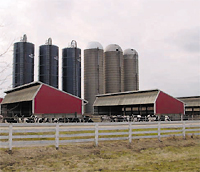|
No More Manure, Say Michiganders
By Laura Fauth
 Thanks to lax enforcement of environmental laws and weak local protections, Michigan has become a "manure magnet," said Dan Farough, political director of the Sierra Club's Mackinac (Michigan) Chapter. In recent years, animal factories have moved to the state in droves, creating a myriad of water quality and public health problems. "Animal factories profit by pollution," said Farough. "They shop around for states with the weakest environmental and public health protections. Michigan was rolling out the red carpet." Thanks to lax enforcement of environmental laws and weak local protections, Michigan has become a "manure magnet," said Dan Farough, political director of the Sierra Club's Mackinac (Michigan) Chapter. In recent years, animal factories have moved to the state in droves, creating a myriad of water quality and public health problems. "Animal factories profit by pollution," said Farough. "They shop around for states with the weakest environmental and public health protections. Michigan was rolling out the red carpet."
Factory farms are finding Michigan less welcoming these days. On Jan. 14, the state bowed to pressure from the U.S. Environmental Protection Agency (EPA) and citizen groups like the Sierra Club when it agreed to enforce the Clean Water Act and issue pollution protection permits for factory farms.
Animal factories, also called concentrated animal feeding operations (CAFOs), crowd thousands of animals into barns the size of football fields and produce an estimated 2.7 trillion pounds of animal waste nationwide each year. The waste is stored in open-air pits called lagoons, which, in addition to emitting a foul stench, often leak or spill into local groundwater, lakes and rivers. According to the EPA, hog, chicken and cattle waste has polluted 35,000 miles of rivers in 22 states and contaminated groundwater in 17 states.
The Clean Water Act requires CAFOs to apply for permits that specify the pollution prevention practices and clean-up standards by which animal facilities must abide. Enforcement of the permit system is the state's responsibility and, until January, Michigan refused to enforce it. As of October 2001, only five of the hundreds of factory farms in Michigan had applied for permits, and the state had refused to process any of the permits. The problem was compounded by a 1999 amendment to Michigan's Right to Farm Act that prevented local authorities from passing ordinances to regulate factory farms.
 As a result, massive hog, chicken, turkey and dairy facilities cropped up throughout the state. Residents initially complained about the smell, but soon realized that the factories were not only unpleasant, but a danger to public health as well. "We were having tremendous air quality problems," said Farough. "Lagoon breaches were poisoning rivers throughout the state. Some residents saw their property values dive by 20 to 30 percent because no one wanted to live near these facilities." As a result, massive hog, chicken, turkey and dairy facilities cropped up throughout the state. Residents initially complained about the smell, but soon realized that the factories were not only unpleasant, but a danger to public health as well. "We were having tremendous air quality problems," said Farough. "Lagoon breaches were poisoning rivers throughout the state. Some residents saw their property values dive by 20 to 30 percent because no one wanted to live near these facilities."
Anne Woiwode, director of the Mackinac Chapter, recalls meeting a couple in their eighties who own a family farm in Michigan's rural Ionia County. A few years ago, a hog facility moved in next door. Now the couples' children and grandchildren refuse to visit because an overwhelming stench of animal waste is always in the air.
According to Woiwode, January's victory resulted from a strong coalition between environmentalists, rural residents and family farmers and a campaign that used a variety of tactics -- including a petition to the EPA, two lawsuits against CAFOs and three "tour de manures," which gave concerned citizens a firsthand look at these polluting facilities -- to put pressure on the state and the local agribusiness community.
In 1999, the Mackinac Chapter, the Michigan Environmental Council, the Michigan Land Use Institute and two individuals petitioned the EPA to remove the state's authority over the Clean Water Act. "Essentially, we asked the EPA to either force the state to obey the law or take a bad cop off the beat," said Woiwode. Spurred by the petition, the EPA conducted a study of Michigan's program for addressing water pollution from animal factories and found that it was "severely lacking" and posed "a serious threat to public health and water quality." The EPA began pressuring Michigan to uphold its Clean Water Act responsibilities, providing activists with a critical source of leverage against the state.
The Sierra Club also brought lawsuits against two Michigan CAFOs for violations of the Clean Water Act, and issued "Notices of Intent to Sue" to three other factory farms. Last August the Club's legal team and the chapter amped up the pressure by sending letters to 92 of Michigan's animal factories "strongly recommending" that they apply for pollution protection permits or run the risk of fines up to $27,500 a day.
Michigan activists are now calling for a moratorium on new CAFOs until the state's pollution protection permit system is in place. The red carpet has been rolled up and put away, but Woiwode and Farough agree there is more work to be done to make sure that polluting factory farms don't feel welcome in Michigan. "The next step is to ensure that Michigan has the best, most effective pollution control permits around," said Woiwode.
Photo of Dan Farough courtesy Dan Farough
Up to Top
|